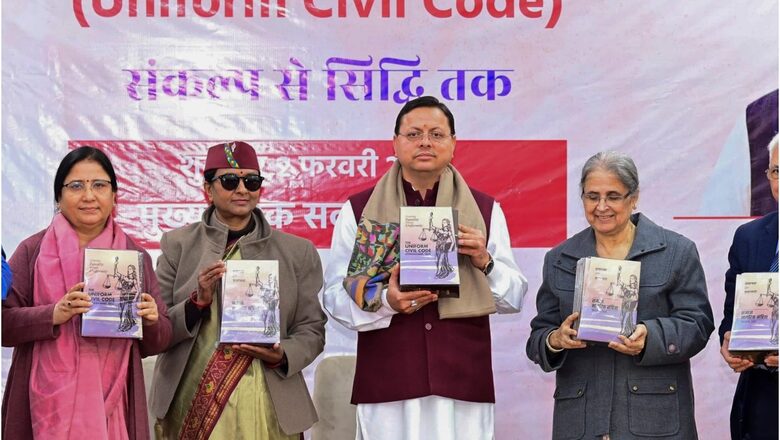
views
Uttarakhand on Wednesday became the first state in India to implement the Uniform Civil Code after the state assembly passed the UCC bill, which may serve as a template for other BJP-run states to enact similar legislation.
The Bill was introduced in the assembly on Tuesday and the opposition had suggested that it should be sent to a select committee of the House first.
Once the Bill gets the governor’s consent, Uttarakhand will become the first state after independence to get a common law on marriage, divorce, land, property and inheritance for all citizens, irrespective of their religion.
Uttarakhand UCC Bill: From Halala Ban to Rules for Live-In Couples, A Look at Top Highlights
Chief Minister Pushkar Singh Dhami said this law is of equality, uniformity and equal rights and it is not against anyone.
“There were many doubts regarding this but the two-day discussion in the assembly clarified everything. This law is not against anyone. It is for the women who have to face difficulty because of the social norms… This will strengthen their self-confidence. This law is for the holistic development of women… The bill is passed… We will send it to the President. We will implement it in the state as a law, as soon as the President signs it…,” he said.
Now the question arises if the Uttarakhand UCC will be the template for the Centre’s law. If not the Centre, the debate around the UCC is heating up in BJP-ruled states like Gujarat, Uttar Pradesh and Assam and they are likely to follow the suit.
GUJARAT
Ahead of the assembly elections, Gujarat home minister Harsh Sanghavi had in October 2022 announced that the state would form a committee to implement UCC.
He also stressed that the decision was made in accordance with Article 44 of Part 4 of the Constitution to apply a common law for all citizens. Minister Parshottam Rupala had asserted that the proposed UCC will not violate any fundamental rights, and will cover the Hindu Marriage Act and Muslim personal laws.
ASSAM
Assam Chief Minister Himanta Biswa Sarma said in January that Assam will be the third state, after Uttarakhand and Gujarat, to implement the UCC. He highlighted that the Assam UCC will not be applicable to the tribal communities, but it will have “innovative points” against child marriage and polygamy.
He further stressed the need to end polygamy, for which, his government is planning to bring a Bill in the budget session of the assembly this month.
An expert committee had submitted a report on the assembly’s competence to end polygamy, following which 150 suggestions were received regarding the proposed Bill to end the social menace in the state, he said.
UTTAR PRADESH
Deputy chief minister Keshav Prasad Maurya hinted that Uttar Pradesh is “not in disagreement with UCC, will implement it at the right moment”.
Rajasthan
Rajasthan Minister Kanhaiya Lal Choudhary also stated that they are making an effort to ensure that Rajasthan becomes the state after Uttarakhand to implement the UCC Bill.
HARYANA
Haryana Home Minister Anil Vij said in 2022 that the implementation of UCC is being studied in the state. Although every citizen is equal for a government, UCC will be considered in some places, he pointed out.
MADHYA PRADESH
Chief Minister Mohan Yadav had this month said in a TV interview that his government will implement UCC. He stressed that he will follow what the Centre will say. “Madhya Pradesh follows the rule of land”, he added. Former CM Shivraj Singh Chouhan had said a committee will be formed in MP to look into the issue.
SOUTHERN STATES OPPOSE UCC
The Kerala Legislative Assembly last August had passed a resolution unanimously against the UCC, calling it “unilateral and hasty”. The resolution, presented by Chief Minister Pinarayi Vijayan, expressed concern and dismay at the central government’s move to impose the rule.
Tamil Nadu chief minister MK Stalin has strongly opposed the UCC. DMK general secretary Duraimurugan had said the common law would “wipe away the personal laws of each religion in personal matters”.
UTTARAKHAND UCC HIGHLIGHTS
The 800-page final report submitted by the five-member committee to Uttarakhand chief minister Pushkar Singh Dhami recommends exempting tribal communities from its purview, focusing on women empowerment, including banning polygamy and forming a uniform marriage age across religions.
• Age for marriage: The age of girls for marriage to be increased to 21 years from present 18 years.
• Marriage registration: The UCC will make the registration of marriages mandatory.
• Live-in couples: It will be mandatory for live-in couples to inform their parents.
• Halala and iddat: The UCC draft mentions discontinuing the practice of ‘halala’ and ‘iddat’ – terms commonly used while settling marriage disputes among Muslims.
• Polygamy: The UCC bans the practice of ‘polygamy’ under Muslim personal law.
• Divorce rights: The draft gives equal grounds and rights to both man and woman, irrespective of the faith, to seek divorce.
• Population control: The draft has reportedly recommended putting a cap on the number of children.



















Comments
0 comment